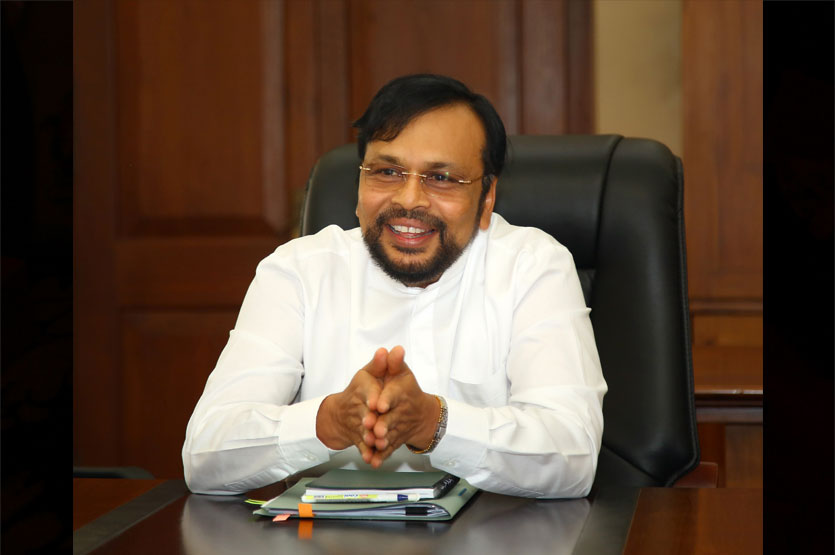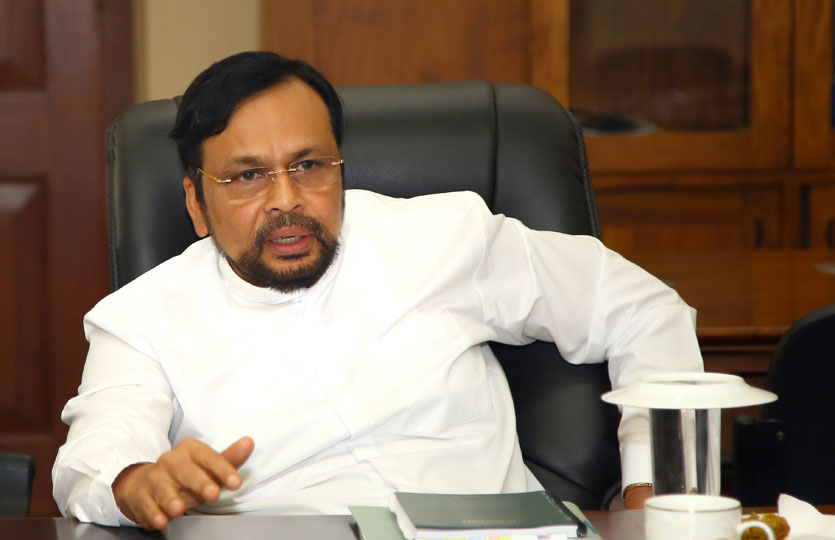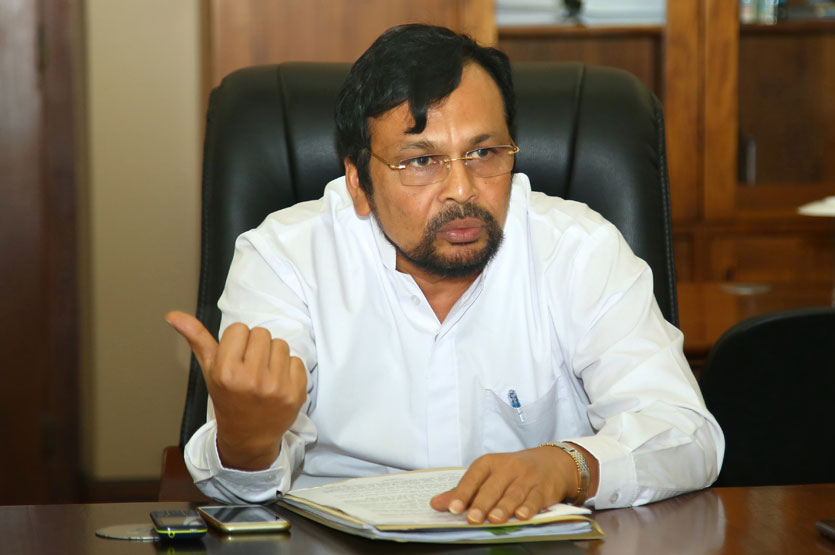Dec 20 2016.
views 1099Ask the Minister: Matters of Public Interest
A chat with Mohan Lal Grero, State Minister of Higher Education
Some of our readers will be very interested in getting to know the progress of the present government and the future plans of the Ministers. With the endeavour of creating awareness in this regard, Life Online met up with some Ministers and asked them a few questions. Their answers will be carried in this weekly column. This week, we speak to Mohan Lal Grero, State Minister of Higher Education.

What is the government policy on private universities?
We don’t have private universities. What we have are private higher education providers. The government policy is to support private higher education, because every year we have about 150,000 eligible students to do higher studies but there are only about 27,500 vacancies in the state sector. That is only about 18% of the total number of eligible students. The other 82% students should also be given an opportunity to get a higher education. It’s their right. So, if there are private organisations willing to provide higher education, then they are welcome. That is the government policy regarding higher education.
On what basis are these institutes approved?
We look into the quality of the institute as well as the quality of programmes they offer. When these institutes apply for approval to the Ministry, there is a committee that visits the relevant places to check on quality assurance and accreditation. Then they audit and evaluate the institute as well as the curriculum and only after that do they get the degree awarding status that is approved by the Ministry of Higher Education. Those institutes are accepted by the government. At present this procedure is not compulsory or mandatory for Higher Education Institutes.

Does that mean that most of these higher education organisations we see mushrooming everywhere are not necessarily approved by the government?
Yes, that’s right. Some institutes have not applied for the certification. They have to apply, pay a fee, and then go through the process of getting approval. After that if we find that they are suitable and up to required standards only do we give approval. There after they can call themselves ‘Institutes approved by the Ministry of Higher Education’.
In the near future we are hoping to establish an independent quality assurance and accreditation commission. We are in the process of drafting the bill now. After this is established then it’ll be compulsory for all institutes to go to this commission and get themselves accredited. The commission will be the authority.
What exactly is the government’s stance on the private medical college in Malabe? Will you have to give in to all the pressure that’s enforced?
There is a Supreme Court case regarding this matter so we have to wait and see. Until then we cannot make haphazard comments regarding this. The freedom for education is a constitutional and a fundamental right of a person. And also SAITM is one of the institutes approved by the Ministry of Higher Education.
When there are students who obtain higher education qualification for Management, Engineering, Law, IT etc. from these institutes and are employed by organisations without causing any problems to anyone, why is there such chaos for only the private medical colleges?
I also can’t understand why that is.
Why is it that university students seem to want to protest for the slightest thing? In light of the fact that education is free, is it fair then for them to spend so much time on the road protesting and spend less time on their studies?
These protests are all politically motivated. The students are used by different political parties for their advantage. They are given a free education and the opportunity to study but they opt to go on the roads and waste time protesting.
Should the government consider talking to first year students during orientation about the value of free education and why they shouldn’t misuse it?
Actually there are so many orientation programmes and so many people coming in to give them motivational speeches and guidance but ultimately they become the prey of some political sectors with ulterior motives.
What is the situation about the ragging issue?
This is due to an outburst of rage in these youngsters. The seniors rag them, and when the juniors become seniors, they do the same thing. I don’t really know the logic behind this. We are establishing a special unit in the UGC which will be operational from January 2017 where any student being ragged can anonymously complain without disclosing their identity. There is a very strong Act regarding this issue where the offender can be imprisoned for 10 years but it is not implemented as the affected parties do not come forward to testify due the fear of getting cornered by the rest of the students. Due to this situation there’s a lack of evidence and the whole incident just gets swept under the carpet.
Sri Lanka is one of the few countries that give free higher education. How much does it cost the government per student?
Our budget for education is approximately Rs. 47 billion. Leaving out the capital expenses, the recurrent expenses come to more than Rs. 350,000 per student per annum.

Currently our country has many citizens who lack access to higher education. What steps has the government taken to solve this?
It is our priority to increase the access to higher education. Every year we plan to increase the intake by 10%. This year we managed to achieve this. If we can keep on doing this, by 2020 we will be able to take in about 35,000 students to state universities.
There is also a project to provide loans to students who are willing to get private sector education which includes Rs. 200,000 as tuition fees as well as Rs. 75,000 for other expenses per annum per student for four years. The most recent budget provided for this. After the student graduates, he or she has to work and pay back the loan. We hope to provide this loan facility to 15,000 eligible students. We also have the Open University, where there are many external degree programmes. Then there are the Vocational Training Institutes that are totally free of charge. There are about 254 Vocational Training Centres, about 37 Technical Colleges, 9 Colleges of Technologists, 6 University Colleges and 01 University for Vocational Education. Students can start from to NVQ 3 to NVQ 7 which is equivalent to the degree level. Cross mobility is also possible now, so that one can go up to the PHD level if they really want to.
What are the scholarships offered by the Ministry of Higher Education for the youth of Sri Lanka?
Well, this whole process of state universities is a scholarship. Apart from that there are the Mahapola bursaries and loans schemes.
What are the University External Degree programmes at present?
90% external degree porgrammes are conducted in Arts and Social Sciences. 10% are in Management. Open Universities offer an Internal Degree although it’s distance learning.
What is the laptop scheme?
The government is providing a loan facility of Rs. 75,000 for university students to buy laptops. They have to pay it back in installments. We want to give them the opportunity to connect with the world.
Shouldn’t courses be changed to suit the job market of today?
Absolutely. Graduates of some courses such as Social Sciences, Humanities, Fine Arts and Arts are unemployed due to the lack of soft skills. So we have to include soft skills and help them to present themselves appropriately and work with teams. There are so many soft skills that the employers demand that needs to be inculcated in students. Not only that, we have to revisit our curriculum and change the curriculum according to the demands of the job market. University collaboration is very important. We have a lot of vacancies in the Hospitality, Flight Engineering, Construction field and IT fields, and also in the BPO and KPO areas. We cannot provide to that demand so we have to concentrate more on those areas.
Did you know?
Questions for the ministers can be emailed to [email protected].
0 Comments